
Gulf Oil was a major global oil company in operation from 1901 to 1985. The eighth-largest American manufacturing company in 1941 and the ninth-largest in 1979, Gulf Oil was one of the so-called Seven Sisters oil companies. Prior to its merger with Standard Oil of California, Gulf was one of the chief instruments of the Mellon family fortune; both Gulf and Mellon Financial had their headquarters in Pittsburgh, with Gulf's headquarters, the Gulf Tower, being Pittsburgh's tallest building until the completion of the U.S. Steel Tower.
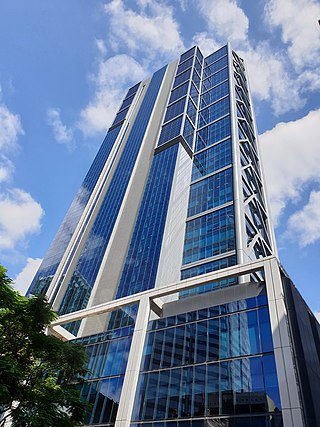
BHP Group Limited is an Australian multinational mining, metals, natural gas petroleum public company that is headquartered in Melbourne, Victoria, Australia.

Husky Energy Inc. is a company engaged in hydrocarbon exploration, headquartered in Calgary, Alberta, Canada. It operates in Western and Atlantic Canada, the United States and the Asia Pacific region, with upstream and downstream business segments. In the 2020 Forbes Global 2000, Husky Energy was ranked as the 1443rd-largest public company in the world.
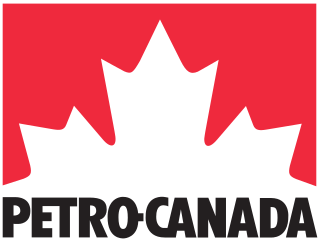
Petro-Canada is a retail and wholesale marketing brand subsidiary of Suncor Energy. Until 1991, it was a federal Crown corporation. In August 2009, Petro-Canada merged with Suncor Energy, with Suncor shareholders receiving approximately 60 percent ownership of the combined company and Petro-Canada shareholders receiving approximately 40 percent. The company retained the Suncor Energy name for the merged corporation and its upstream operations. It continues to use the Petro-Canada name nationwide.

Dynegy Inc. is an electric company based in Houston, Texas, in the United States. It owns and operates a number of power stations in the U.S., all of which are natural gas-fueled or coal-fueled. Dynegy was acquired by Vistra Corp on April 9, 2018. The company is located at 601 Travis Street in Downtown Houston. The company was founded in 1984 as Natural Gas Clearinghouse. It was originally an energy brokerage, buying and selling natural gas supplies. It changed its name to NGC Corporation in 1995 after entering the electrical power generation business.

BP Canada was a Canadian petroleum company and subsidiary of British Petroleum that operated between 1955 and 1992. The name refers to a group of companies that engaged in various segments of the petroleum industry lifecycle. BP entered the Canadian market in October 1953 when it purchased a 23 percent stake in the Triad Oil Company. In 1955, BP formed a Canadian subsidiary, based in Montreal, called BP Canada Limited. The company began acquiring retail stations in Ontario and Quebec and in 1957 started construction on a refinery in Montreal. By the end of the 1950s BP Canada was a fully-integrated operation. In 1964 it acquired from Cities Service the Oakville Refinery, and then expanded its operations significantly in 1971 when it acquired Supertest Petroleum.

Marathon Oil Corporation is an American company engaged in hydrocarbon exploration incorporated in Ohio and headquartered in the Marathon Oil Tower in Houston, Texas. A direct descendant of Standard Oil, it also runs international gas operations focused on Equatorial Guinea, offshore Central Africa.

Suncor Energy is a Canadian integrated energy company based in Calgary, Alberta. It specializes in production of synthetic crude from oil sands. In the 2020 Forbes Global 2000, Suncor Energy was ranked as the 48th-largest public company in the world.
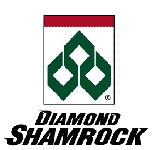
Diamond Shamrock Corp. or Diamond Shamrock Refining and Marketing was an oil refinery and gas station company in the United States, headquartered in San Antonio, Texas.

MOL Plc., also commonly known as MOL Group, is a Hungarian multinational oil and gas company headquartered in Budapest, Hungary. Members of MOL Group include among others the Croatian and Slovak formerly state-owned oil and gas companies, INA and Slovnaft. MOL is Hungary's most profitable enterprise, with net profits of $770 million in 2019. The company is also the third most valuable company in Central and Eastern Europe and placed 402 on the Fortune Global 500 list of the world's largest companies in 2013 with a revenue equal to one fifth of Hungary's GDP at the time.
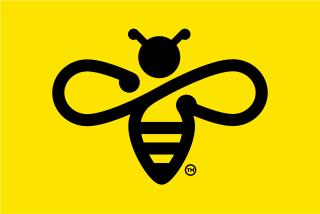
Mercury NZ Limited is a New Zealand electricity generation and multi-product utility retailer of electricity, gas, broadband and mobile telephone services. All the company's electricity generation is renewable.
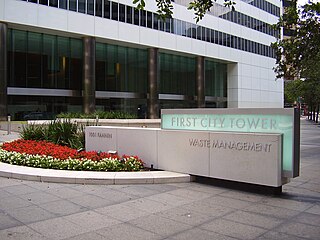
Waste Management, Inc., doing business as WM, is a waste management, comprehensive waste, and environmental services company operating in North America. Founded in 1968, the company is headquartered in the Bank of America Tower in Houston, Texas.
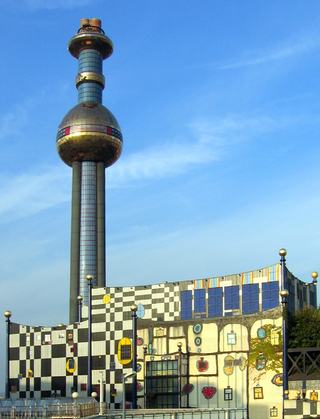
Waste-to-energy (WtE) or energy-from-waste (EfW) is the process of generating energy in the form of electricity and/or heat from the primary treatment of waste, or the processing of waste into a fuel source. WtE is a form of energy recovery. Most WtE processes generate electricity and/or heat directly through combustion, or produce a combustible fuel commodity, such as methane, methanol, ethanol or synthetic fuels.

Eastern Electricity plc was an electricity supply and distribution utility serving Eastern England, including East Anglia and part of Greater London. It was renamed Eastern Group under which name it was listed on the London Stock Exchange and was a constituent of the FTSE 100 Index until it was acquired by Hanson plc in 1995, before being purchased by Texas Utilities in 1998.

Obsidian Energy Ltd. is a mid-sized Canadian oil and natural gas production company based in Calgary, Alberta.
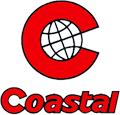
Coastal Corporation was a diversified energy and petroleum products company headquartered at 9 Greenway Plaza in Greenway Plaza, Houston, Texas. The company was founded in 1955 by Oscar Wyatt and incorporated in 1955 as Coastal States Gas Producing Company. It merged with the El Paso Corporation in 2001. As of 1999, Coastal was a Fortune 500 company with 13,300 employees and annual revenues of $8.2 billion.

BP p.l.c. is a British multinational oil and gas company headquartered in London, England. It is one of the oil and gas "supermajors" and one of the world's largest companies measured by revenues and profits. It is a vertically integrated company operating in all areas of the oil and gas industry, including exploration and extraction, refining, distribution and marketing, power generation, and trading.

Although there are numerous oil companies operating in Canada, as of 2009, the majority of production, refining and marketing was done by fewer than 20 of them. According to the 2013 edition of Forbes Global 2000, canoils.com and any other list that emphasizes market capitalization and revenue when sizing up companies, as of March 31, 2014 these are the largest Canada-based oil and gas companies.

Gulf Canada was a Canadian integrated petroleum company that existed between 1944 and 2001. Gulf Oil Corporation began operating in Canada in 1942, and two years later formed a Canadian subsidiary called the Canadian Gulf Oil Company. In 1956 Canadian Gulf Oil merged with the British American Oil Company and until 1969 operated under the British American name. In 1969 British American amalgamated with its subsidiaries into a new company called Gulf Oil Canada Limited.

















